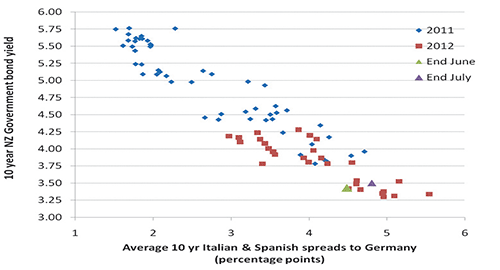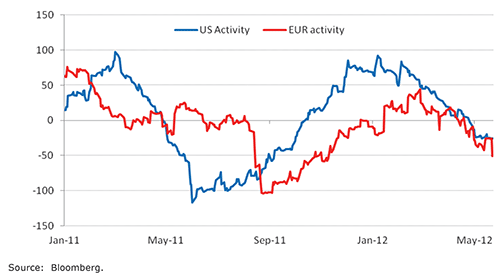Harbour: Believe me, it will be enough
In their latest fixed interest commentary Harbour Asset Management's Mark Brown and Christian Hawkesby assess the latest developments in Europe offer some thoughts on the Reserve Bank's next move.
Tuesday, August 7th 2012, 3:00PM  2 Comments
2 Comments
by Harbour Asset Management
Key Points
- Following the market friendly EU Summit at the end of June, doubts emerged about details of the rescue package, and the casualty list appeared to lengthen with concerns of the finances of some Spanish regions and Italian cities.
- With Spanish bond yields holding above 7%, these strains prompted the President of the ECB, Mario Draghi, to emphasise that the central bank was "ready to do whatever it takes", and "believe me, it will be enough".
- Draghi's comments resulted in a strong rally in risky assets through the end of July, but have left markets with high expectations that his words will be followed up with concrete actions in the weeks and months ahead.
- In New Zealand, NZ yields finished a volatile month broadly unchanged.
As expected, the Reserve Bank of New Zealand left its official rate unchanged at 2.5%, leaving the door open for the next move to be a hike or a cut, depending on how the European crisis develops and the pace of momentum in the domestic economy. - Once again, the NZ and Australian corporate bond markets have remained surprisingly resilient throughout the volatility in global markets.
EU summit aftermath
For over a year, we have been longing to write a monthly commentary that is not dominated by developments in Europe, and without any reference to getting closer or further away from the brink (or the location of the brink being miraculously shifted). However, yet again, European developments were the main driver over July. And, this looks set to continue while the structural, economic and social backdrop is so challenging, and both policymakers and markets are travelling in uncharted territory. There is scope for surprise from more directions than normal.
The chart below is a stark illustration of how connected the New Zealand fixed interest market has become with Europe. As markets become more stressed, funding costs for the European periphery rise and bond yields in core countries like New Zealand fall with the flight to safety (Chart 1).
Chart 1: NZ Government Bond Yields and European Periphery Spreads

At the end of June, European authorities exceeded expectations with a market-friendly package of measures following the latest EU Summit. After much public in-fighting, expectations had been very low, and the market was very encouraged by the list of efforts being made to break the link between weak sovereigns and weak financial sectors.
It appeared that the Europeans were choosing closer integration to strengthen their collective prospects and so July began strongly.
However, in what has sadly become a regular pattern, it did not take long into July before doubts began to emerge about the effectiveness of the latest package of measures. Delays looked inevitable, given the need for parliamentary and legal approvals on key details. Moreover, after the summit the Germans appeared at most lukewarm on the idea of leveraging the European Stability Mechanism (ESM) for greater effect - a key plank of the package. At the same, the casualty list appeared to lengthen with concerns about the finances of some Spanish regions and Italian cities, adding to the burden of those sovereigns.
"Ready to do whatever it takes"
Throughout the crisis, many commentators have quoted 7% being an unsustainable level of bond yields for periphery countries, where low economic growth and high funding costs create vicious cycles of ever higher debt levels. With Spanish bond yields holding above 7% for a sustained period, and Italian bonds approaching those levels, the President of the ECB, Mario Draghi, stepped forward to calm markets. He emphasised that the central bank was "ready to do whatever it takes", and "believe me, it will be enough".
Markets moved sharply in response to Draghi's comments, with many risky asset recovery earlier losses in the month. We believe this reflects two factors.
First, for some time, the ECB has been seen by markets as the European institution that can make a material difference in the crisis. The ability of central bankers to provide liquidity to markets provides a much quicker shot in the arm, at least in the short term.
Second, Draghi's comments appeared to be a dramatic change in tack from the ECB, given that for many months Draghi had been dampening expectations of central bank action. Instead, he had emphasised that the problem with Europe was the need for long-term structural and economic reforms, and that these could only be delivered by politicians. In effect, Draghi had been cunningly holding back from action in an effort to force politicians into action first.
With Draghi's comments so vague (to rival the days of Alan Greenspan), the market has been left to work out what exactly the ECB doing "whatever it takes" means, and when they will be ready and willing to do it.
In the eyes of the market, the ideal scenario is:
- the ESM being given a banking licence so that it can leverage its capital and use an expanded balance sheet to buy periphery government debt directly in the primary and secondary market, and to recapitalize banks directly, and·
- the ECB reinforcing these actions by buying periphery government debt in the secondary market to provide additional liquidity and help cap yields. (Given the rules against the ECB undertaking monetary financing to European governments, the ECB can't do large scale QE via purchases of government bonds like the Fed or BoE.)
- the ECB restarting their long-term refinancing operations (LTROs) to provide plentiful liquidity to the interbank funding market.
The challenge in Europe remains the difficultly co-ordinating actions between authorities, receiving the required national and legal approvals, and working through the details of any new package of measures.
In the event, the ECB meeting did produce indications of policy progress, although implementation hurdles remain and the situation remains essentially the same. Political and policy decisions are needed to restore competitiveness in Europe. In the meantime, the economic outlook is very weak and looks likely to stay so for many more months.
The extent of current weakness is illustrated by the prolonged period of negative economic surprises seen across the US, Europe and China (Chart 2). In bond markets, this background has reinforced the ability for bond yields in core countries to remain relatively low for some time.
Chart 2: Citigroup Economic Surprise Indices

Source: Bloomberg.
Watch, Worry, and Wait
This uncertain global backdrop was one factor that motivated the RBNZ leaving the Official Cash Rate (OCR) unchanged at 2.50%.
Our reading of the July OCR review was that the RBNZ had genuinely moved to a neutral stance: in their view, growth prospects from the recovery in the NZ housing market and Canterbury rebuild are almost equally offset by the drag on growth from fiscal belt tightening, weakening trading partner growth and the high exchange rate.
We believe the RBNZ has left the door open for the next move in the OCR to be either a hike or a cut. If the next move is within the next 6 months, it is more likely to be a cut in response to a genuine disaster in Europe that freezes global markets and threatens financial stability. If the next move is not for another 12-18 months, it is more likely to be a hike as the NZ housing market recovery and Canterbury rebuild begin to gather momentum.
In our view, the medium-to-long-term outlook for bond yields globally remains asymmetric, with more chance that they will eventually rise from these low levels. However, we think that while Europe faces such significant economic and political challenges any marked rise in interest rates is likely to remain capped for now. In the meantime, the market is likely to ebb and flow with news from Europe and the associated bouts of optimism and pessimism.
Mark Brown & Christian Hawkesby
Harbour Asset Management
Important disclaimer information
| « Are we seeing the beginning of a new global recession? | Hamish Douglass Unplugged - Latest Video from Adviser Briefing - August 2012 » |
Special Offers
Comments from our readers
Technically, the ECB can buy sovereign bonds on the market.
However, it hasn't done this in 17 weeks. The reason? Germany wouldn't stand for it. Draghi seems to believe he can start doing this again now.
If the ECB moves without Germany's approval, things could get ugly very fast. The reason is that Germany is the true backstop for the EU. And if Germany says "nein" then the markets will call the ECB's bluff.
secondary item would be for the ECB to buy bank bonds in concert with the bailout fund the ESM or the EFSF.
These options are also problematic. First off, the EFSF is essentially tapped out with only €65 billion in firepower left (after the €100 billion Spanish bailout). So scratch that option.
As for the ESM, it has not even been ratified yet! (Germany has held up its ratification in courts until September 12 2012).
On top of this, Spain and Italy will contribute 30% of the ESM's funding. So they're going to be bailing themselves out!?!
OK, let's calm down and assume that Spain and Italy don't have to do this (impossible given the way the ESM is structured). If you remove Spain and Italy from the funding mix it means that Germany and France would have to shoulder 66% of the ESM's funding.
Neither Germany nor France have that kind of money (66% of €700 billion). Even if they did, for them to be on the hook for this would mean both countries getting downgrades.
But what about the ESM working with the ECB to prop things up?
Once again the issue comes back to Germany which is against it. Indeed, Finance Minister Wolfgang Schauble has said the ESM doesn't need a banking license (which rules out the ESM buying bank bonds) while German officials in general have voted against increasing the ESM several times and have said the ESM shouldn't be used to buy sovereign bonds.
Thus, by simply working through the facts and the math, we find that this entire rally is based on hopes and delusions... neither of which will manifest in real money for Spain or Italy.
Indeed, the only thing that could potentially save Europe would be for Germany to agree to backstop everything and monetize all debts in one form or another with the ECB's help.
The odds of this are less than NONE. Angela Merkel is up for re-election next year. There is NO WAY on earth she'd engage in a policy that would result in Germany losing its AAA status (which this policy most certainly would do).
On top of this, Germany doesn't have the funds to do this. It's already on the hook for nearly €1 trillion in backdoor bailouts of the EU. And it's now fast approaching the dreaded Debt to GDP ratio of 90%.
Sign In to add your comment
| Printable version | Email to a friend |









